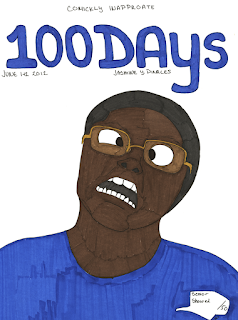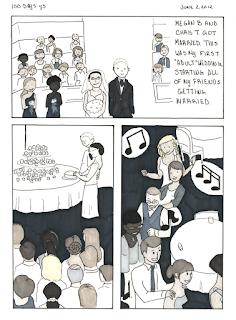by Anna Tecson
While conducting a zine workshop at American University, fellow DC Zinefest organizer Anne Buckwalter (annedrawscomics.tumblr.com) and I demonstrated to a class of fine arts graduate students, simply as a matter of course, the fundamentals of folding a single sheet of paper into a pocket-size book. After which the students launched into shredding campus going-out guides for collages, Crayola markers and glue sticks flying.
Art students in particular might easily understand the symbiotic relationship of consuming and creating for a thriving cultural ecosystem. Yet, for this project on arts and activism, they’re also challenging any perceptions of art as a static work within the confines of a studio. In addition to covering basic zine production, the students watched a screening of Robin Bell’s documentary “Positive Force: More Than a Witness”, which features 30 years of punk politics in action. The students had the unique opportunity to meet Mark Anderson and his colleagues, Sarah Himmelfarb and Dennis, of Positive Force and We Are Family, DC-based organizations with extensive histories of activism, advocacy, and community-building. After which the students embarked on fieldwork to explore and participate in social causes meaningful to them as the basis for their zines. The art instructor at AU is Professor Naoko Wowsugi. She has headed several projects focusing on art and community involvement for social change: http://www.wowsugi.com.
Although these DIY pubs cover every possible topic, early zines stemmed from sci-fi culture and punk. In the 1930s, sci-fi zines emerged when readers of commercial magazines began engaging more with one another in discourse or fandom. “Letters to the Editor” submissions evolved into independent publications. Greater access to self-publishing technology in the 70s, concurrent to the counterculture spirit of punk, also boosted the genre. Since then, the same do-it-yourself practices and ethos have led to a stunning diversity of zine publishing in terms of subject matter, artistic presentation, and social causes. Zines, often in the form of mini-magazines or comics, can vary in technical production, from 4-color, bound and cloth-covered to photocopied and stapled. They’re usually hand-drawn or hand-lettered, consisting of original and collaged art, and are often produced in small batches. Production costs stay within a minimal range because zines are shared and swapped as freely as they’re bought and sold (usually averaging $3–$5, with some exceptions). Regardless of the current boundlessness of format, metadata, and reach of commercial publishing, zinesters maintain a sentient immunity to conventions and economies of scale and instead connect with and revere so many voices and perspectives through these hoardable pocket-size treasures.
This summer, DC Zinefest will host its 7th annual event, July 15, at St. Stephen and the Incarnation Episcopal Church. DC Zinefest provides a space for zine-makers, self-published artists, and writers to share their work with each other and the Washington, D.C., community.
Panel discussions will focus on arts and activism, topics relevant to people of color, and issues related to mental health. Tablers at this year’s DC Zinefest include DC publishers Swamphouse Press (promising “more Dungeons and Dragons content this year”) and The Doldrums (Unstuck, about feeling creatively and personally stagnant). Vinyl Vagabond features any and all matters related to vinyl music; creators Sara and Eric Gordon also make a variety of mini-comics such as Mr. Squibly, Adventures of a Terrified Pickle, Verse Scribble Verse, Thank You for Your Cooperation: Robocop 1987 Fanzine, Know a Ramen, and more. Zack Bly, a member of the D.C. comics collective Square City Comics, will feature his latest release, a technological thriller about a pig computer hacker. Kaila Bell’s (mostly) autobiographical Nun Comix draws scenes and stories from everyday life, with a special focus on LGBTQA issues, (a lack of) fitness, and living with anxiety. Her latest release, Someone’s in the Kitchen with Obsessive Compulsive Disorder, is half foodie zine and half self-help. JC, of Jenny and the Librarians, writes about disability and mental health. Tributaries shares her experiences related to juvenile rheumatoid arthritis; and Collide is a compilation zine on the intersection of physical and mental illness. Toni Lane will share her creations in Ghetto Girls Rule: “Ghetto Girls are personas from my memory and imagination. Their rules are what they give herself to live by. My rule is: Do Your Dream. Girls have always been the matriarch of most families. For this, strength is strong even when all seems lost. Ghetto Girls can be your sister, your neighbor, the girl up the way, in a place shared, where loneliness is not healthy and silence is a sound of trouble.” The Red Sweater Zine Collective promotes and distributes zines and handmade goodies from artists and writers, including zinesters who can’t get to zinefests because of cost, logistics, or other factors. Their works cover aging, mental health, the joy of dance, and also include thumb-size zines filled with enormous haiku. Other tablers include G. E. Gallas, writer and illustrator best known for her graphic novel, The Poet and The Flea, about William Blake, and her short film “Death Is No Bad Friend”, about Robert Louis Stevenson, and Team KK, who bring “silly pop-culture inspired illustrated zines inspired by bad movies, Nic Cage, The Rock, and anime”. Also, a limited supply of posters featuring this year’s commissioned art by Austin Breed will be available.
The organizers, all volunteers, hold fundraisers and promotional events throughout the year, most recently open mic readings at Black Cat and Pottery House and Zine Swaps at Fantom Comics. DC Zinefest also tabled at an event hosted by the National Museum of Women in the Arts, which featured a conversation with leading women in the comic world fighting for justice and dispelling traditional stereotypes in fiction and beyond. This year, DC Zinefest, through fundraising alone, had the means to grant stipends to underrepresented publishers (people of color, people with disabilities, people who identify as LBGTQIA+, and people who earn low incomes).
Some attendees who travel from out of town manage to find hosts among the DC zinester community and reciprocate in kind at events in Richmond, Philly, Boston, and New York, to name only a few (visit zinenation.org for the entire list of national and international zine events.) The DC and Arlington Public Libraries host zine-making workshops, and the DC Public Library Punk Archives and the University of Maryland D.C. Punk and Indie Fanzine Collection maintain repositories of works dating from the mid-1970s. Local events leading up to this year’s DC Zinefest include the following:
Zine Workshop
Friday, July 7, 5:00 to 7:00 p.m.
The Connection: Arlington Pop-Up Library
2100 Crystal Drive, Arlington, VA 22202
Zine Lab
Tuesday, July 11, 6:30 to 8:30 p.m.
Mt. Pleasant Library
3160 16th St. N.W., Washington, DC 20010
Saturday, July 15, 2017
10:00–4:30 p.m.
1525 Newton St NW, Washington, DC 20010





